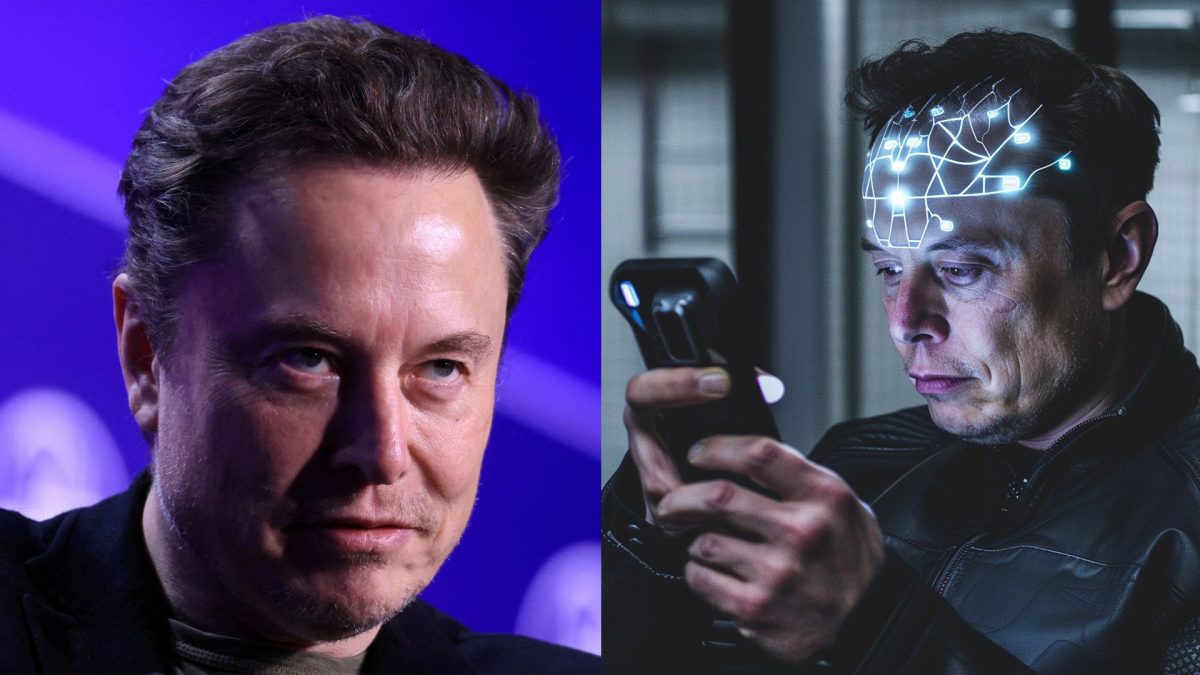Musk’s comment comes at a time when Neuralink is making significant strides in brain chip technology. After working with a 29-year-old named Noland Arbaugh, Neuralink recently announced that it is now accepting applications for a second participant in its trials read more
)
Musk’s vision for a future without phones, replaced by brain chips, may seem far-fetched to some. However, Neuralink’s ongoing research and trials are paving the way for this possibility. Image Credit: AFP, X/Elon Musk
Elon Musk, the CEO of Neuralink, has made a bold prediction about the future of technology. He believes that Neuralink’s brain chips will eventually replace phones. Responding to a post on X, Musk wrote, “In the future, there will be no phones, just Neuralinks.”
The post that sparked Musk’s comment featured an AI-generated image of him holding a phone, with a neural network design on his forehead. The caption asked if people would install a Neuralink interface to control their devices with their thoughts. This generated a mix of reactions from users on X. One user wrote, “Love you Elon. But brother, no way in hell am I implanting something in my head. That’s a hard no for me bro,” while another commented, “That’s going to be wild.”
In the future, there will be no phones, just Neuralinks
— Elon Musk (@elonmusk) June 17, 2024Musk’s comment comes at a time when Neuralink is making significant strides in brain chip technology. The company recently began its first human trials, involving a 29-year-old named Noland Arbaugh. Arbaugh, who was left paralyzed from the shoulders down following an accident eight years ago, underwent brain surgery on January 28 to have the Neuralink chip implanted. He has since shown promising signs of recovery.
Arbaugh’s progress was highlighted in a video streamed by Neuralink in March. In the video, he told audiences how Neuralink’s BCI chip has helped him transform his disability to engage in most of the activities that he loves. Playing chess, for example. “It’s crazy, so cool…I can’t describe how cool it is to be able to do this,” Arbaugh said.
Neuralink recently announced that it is now accepting applications for a second participant in its trials.
While Neuralink is making headlines with its technological advancements, the company is also facing challenges. According to a report by the New York Post, a former Neuralink animal care specialist, Lindsay Short, has filed a lawsuit against the company. She alleges that Neuralink failed to provide proper protective equipment while she cared for animals.
Despite these hurdles, Neuralink’s progress is noteworthy. The company’s mission to develop brain chips that can interface directly with electronic devices represents a significant leap in neurotechnology. If successful, this could revolutionize how we interact with technology, potentially making smartphones and other devices obsolete.
Neuralink’s work has garnered significant attention and interest, not only for its potential to change everyday technology use but also for its implications in medical science. The ability to restore functions for individuals with paralysis or other neurological conditions could be life-changing.
Musk’s vision for a future without phones, replaced by brain chips, may seem far-fetched to some. However, Neuralink’s ongoing research and trials are paving the way for this possibility. As the company continues to develop and test its technology, the world watches with anticipation to see if Musk’s prediction will come true.
For now, Neuralink’s journey is a blend of groundbreaking advancements and ongoing challenges, reflecting the complex nature of pioneering new frontiers in science and technology.

 3 months ago
40
3 months ago
40
)
)
)
)
)
)
)
)
)
)
)
)
)
)
)
)
)
)
)
)
)
)
)
)
 English (US) ·
English (US) ·